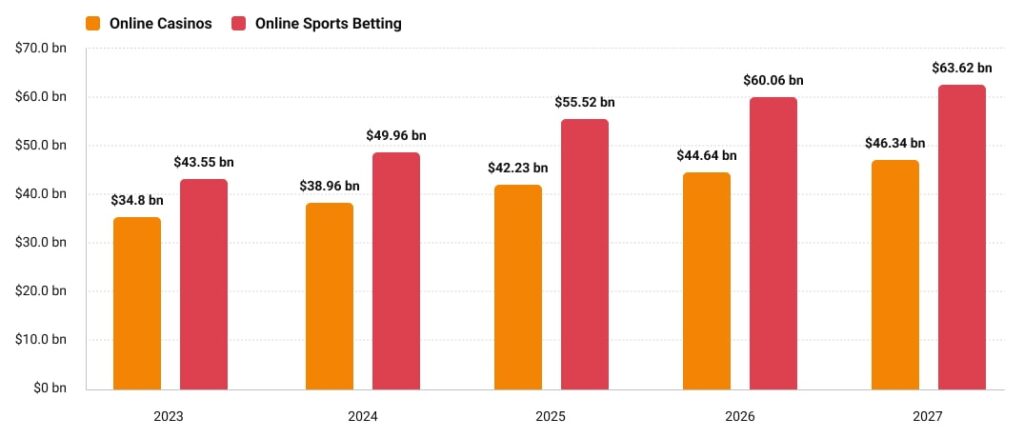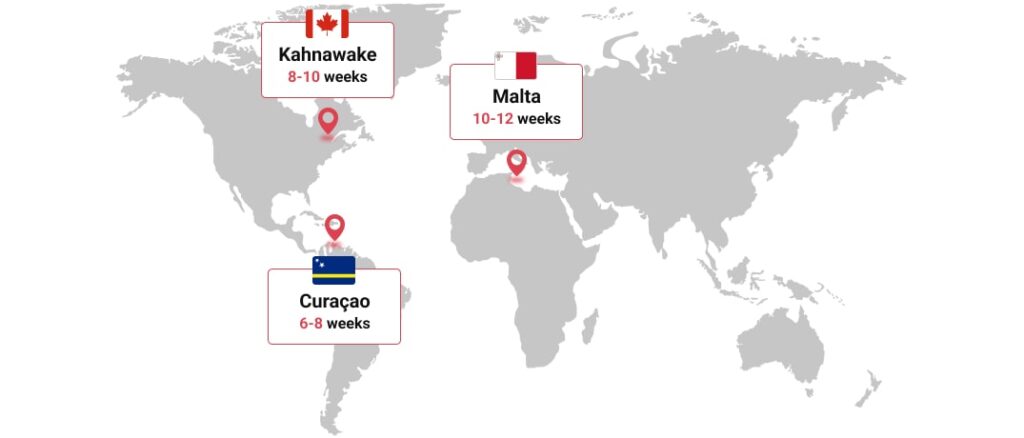
Casino Licenses: Everything You Need To Know
Table of Contents
- Gaming Licenses for Casinos
- The Evolution of Casino Gambling
- What is a Gaming License?
- Why do I Need an Online Gaming License?
- Advantages of Having a Gaming License
- Statistics and Facts about Gaming License
- Types of Gaming Licenses
- How to Get a Gambling License
- Gaming License Requirements
- How Much Does a Gambling License Cost?
- The Most Popular Gaming License Jurisdictions
- Gambling Black Markets
- Conclusion
- FAQ
From casino operators to games providers and players whose love for gambling keeps the business rolling, every segment plays a critical role in ensuring the success of iGaming. The online gambling industry now actively fortifies itself as a major player in the global economy, and so it has become more important than ever before that online gambling licenses be given serious thought.
In this article, CasinoRIX experts will provide you with relevant information about online casino licenses, its history, online gambling jurisdictions, and why online gaming licenses are an essential resource for all stakeholders in the iGaming industry.
Gaming Licenses For Casinos
There is quite a lot of money involved in the world of gambling. Casino operators are investing capital into providing players with an impressive entertainment stream that is equally profitable, while the players themselves are putting in a lot of their money into online casino games hoping to win big. As a result of this massive financial investment, businesses that provide any form of online gambling service are required to obtain the necessary casino gaming license which grants them the authorization to conduct such businesses.
While it is a fact that online casino gambling licenses allow casino operators the necessary bandwidth to operate legally and under strict regulations, licensing also benefits the customers and casino game vendors. But before we go on to explain what a gaming license is, here is some brief background information about the history of gambling.
The Evolution of Casino Gambling
Throughout all of human history, gambling has been enjoyed by various people in one form or other. From Egypt where there have been excavations of the oldest-known dice, to artwork found on the body of sculpted Greek and Roman pottery that indicate betting on animal fights, to more recent discoveries about ancient China where of rudimentary games of chance were discovered on tiles, humans seem to have always loved to gamble and would do this at every opportunity.
Although it is widely believed that playing cards first began in China in the 9th century, the exact type of card games that were played are relatively unknown because the cards look very little like what is used today. They were often embedded with designs of human forms, but as the card games began spreading throughout Europe, the familiar designs of Kings and Queens began to appear. Earlier on in China at around 200 BC, a game known as “white pigeon ticket” used to be played in what seemed like gambling establishments with the permission of a governor who received a set percentage of the profits. This is the earliest known type of gambling regulation in human history.
As gambling began to evolve and spread through societies far and wide, it became more organized and the need for appropriate regulations became necessary. The first regulated land-based casinos and gambling houses first appeared in Italy in the 17th century. One of the first of such was “The Ridotto”, which was established in Venice in 1638 as a regulated gambling institution. By the 19th century, more casinos began to spring up throughout continental Europe. Casino games like vingt-et-un and roulette finally reached the United States with early settlers from France who made use of steamboats on the Mississippi River as a makeshift gambling venue for wealthy traders and farmers. As at 1829, historical studies have found that a version of poker which originated in 17th century Persia was popular among gamblers in New Orleans.
As the years went by and with little technological advancements and the mechanization of casino gambling, player winnings became regulated more accurately. The first gambling machine was developed in New York by Sittman and Pitt at about the same time when the Liberty Bell machine was invented in San Francisco by Charles Fey. With the invention of the first video slot in 1976, a way was paved for the introduction of online video slots which followed.

Online casino gambling
By the late 80s and early 90s as the internet began to go mainstream, it opened up the door to more opportunities in remote gaming. But before online casinos became a thing, Microgaming, one of the biggest slots and casino games providers in the world today, had developed the first fully functional gambling software. The company which is based on the Isle of Man secured a partnership with CryptoLogic, an online security software company, to secure its games – this collaboration meant that transactions would be safe and subsequently led to the introduction of the first online casinos in 1994.
In 1994, the Carribean island country of Antigua and Barbuda passed the Free Trade & Processing Act, granting licenses to organizations that applied to open various online casino platforms. With the establishment of the Kahnawake Gaming Commission (KGC) in 1996, all online gambling activity within the Mohawk Territory of Kahnawake began to be regulated. The commission also started issuing internet gambling licenses to several online casinos and poker rooms around the world in an attempt to keep the operations and games on licensed online gambling platforms fair and transparent. By 2003, a few land-based casinos began to key into the iGaming industry by establishing the first live dealer casinos through one of the world’s largest suppliers of online casino games software.
What is a Gaming License?
Getting a gaming license online is a very important step for casino operators who intend to run a successful business. An online casino gaming license is an authorization or official permit granted to gambling companies through the issuance of an acceptable legal document. Not only will this document allow a company to provide, operate, and administer online gaming services within a particular territory, it also institutes certain obligations that must be satisfied by the company, which in turn increases the confidence of all players who make use of that company’s service. As regulations are expected when dealing with land-based casinos, online casino gambling follows the same process to ensure transparency and fairness.
The possession of a gambling license online from more than one gaming license jurisdiction can be a major boost for the reputation of an online casino. Although many casinos operate with just one, it’s a great idea to have at least one international gambling license in addition to a local or regional gambling license. In addition to strengthening the reputation of the online casino brand, it allows the online casino to provide services for a much wider audience. Research has found that generally, customers of online gambling companies prefer turning to casino operators that possess multiple licenses. This trend is most likely because playing games at an online casino with two or more licenses offer more benefits that include a wider selection of games to choose from, stronger security protocols, more payment options, and better accountability.
With online casino games of chance like slots, table games, and sports betting, accountability and fairness are an utmost priority. Regulations are therefore essential so that oversight can be maintained on the exact nature and outcome of games. The types of regulation guiding each online casino depends a lot on the jurisdiction where the gaming license was obtained. Jurisdictions like Curaçao are well known for their relaxed regulations, while others like the United Kingdom Gambling Commission (UKGC) are seen as more stringent with their regulations. What matters however is that regardless of the types of gambling licenses or the jurisdictions, the days of having unlicensed online gambling platforms are largely over. Many nations are now cracking down on any online casino that operates illegally without registration by having at least one license – those that are caught are either slapped with heavy fines, get taken down, or might even risk jail time.
Why do I need an Online Gaming License?
Having a casino that is backed up with an accompanying online gaming license is critical for the success of any serious online casino. Not only does it underscore the casino’s commitment to fair play, legality, and the protection of users, it also significantly contributes to the reputation and standing of the brand. To operate or play at an unlicensed online casino is to expose both the business and players to dire consequences that may range from strict penalties, facing legal action, loss of investment, and an exposure to criminal attacks. It is essential therefore to prioritize having the appropriate gambling licenses, and as you read further, you will discover how to get a gambling license as well as the needed requirements for gaming licenses.
But before we delve into that, listed below are some of the reasons why having a valid casino license is crucial:
The iGaming market is choked full with quite a lot of real money casinos offering various types of casino games to players on the promise that they will win big. Having a license goes a long way to portray the operator of an online casino as a trustworthy platform credible enough to play casino games safely and without fear of unscrupulously losing funds
One of the benefits of having a legitimate status is that players will feel protected while playing on a licensed online casino. Having the appropriate licensing guarantees that the online casino will attract players and retain them.
Another beneficial aspect of an online casino that operates legally has to do with creating an avenue for access to key partners in the iGaming industry. Many game software providers and payment systems will only partner with licensed operators as part of their own safety measures.
An online casino that operates within the framework of a regulatory body shows that it adheres to all local and international policies required by the regulator providing oversight. This sort of oversight is a relatively secure safeguard against any legal and financial risks.
If the purpose behind starting an online casino is to provide entertainment to many different people while earning some profit in the process, then being able to reach a global or regional audience is a necessity. Certain iGaming markets will only allow licensed casinos to operate within their borders, so acquiring one ensures access to profitable markets and broadens the user base.
One of the jobs of regulatory bodies and licensing authorities is to provide a structure that allows for a fair resolution of disputes between customers and operators or between partners and operators. Such structures can only be available to online casinos that hold the appropriate valid license.
Summarily, the need to prioritize the acquisition of an online gaming license is crucial in paving the way for a very successful mobile gambling operation. The iGaming industry has adopted a policy of instituting regulations that protects operators, iGaming partners, and players in one singular objective. Although there have been criticisms in some quarters about how heavy regulations can interfere with innovations, many iGaming jurisdictions have been able to strike a healthy balance between oversight and allowing the industry growth of internet gaming
Risks of Operating an Online Gaming Business without a License
The importance of having an online gaming license in at least one jurisdiction cannot be overemphasized. The regulation of the iGaming industry has become even more necessary in recent times because these virtual gaming platforms are actively contributing to the overall economic development of the nations hosting them. Not having a license can pose some very severe risks for operators, customers, and even affect the stability of the iGaming industry as a whole.
Highlighted below are the risks associated with operating an online casino without a license:
- First and foremost, it is illegal to run an online casino without a license as this can lead to a string of legal troubles that will inevitably cost a lot of money
- Advertising is going to be a major challenge because sponsors or advertisers will be cautious about doing business with an unlicensed entity
- An online casino without a license will find it a challenge when opening settlement accounts as most financial institutions don’t offer their services to businesses that are unlicensed. Trying to partner with e-payment providers will be difficult.
- An online casino that continues operating without a license faces the risk of being shut down and even getting blacklisted from getting an online gaming license in the future
- There will be an inadvertent financial loss because an unlicensed online casino cannot gain the confidence of players. Usually, the success of an online casino depends heavily on the number of people playing its games and staking real money
- As a part of their own safety measures and quality checks, most software providers and game developers often avoid partnering with unlicensed casino operators to protect their reputations
- The absence of regulation and licensing from a certified gambling authority means that financial disputes or business conflicts cannot be resolved legally

Advantages of having a Gaming License
Having a gambling license can make an online casino website safer and very succesful. To further highlight the importance of having a license from the singular perspective of online casino operators, below are some key points to note:
- Your online casino can benefit from tax advantages and financial policies that boost the profitability of your business
- Your gambling services will be well received in a legal way anywhere in the world, especially when seeking licensing in new jurisdictions
- You can avoid being prosecuted for financial fraud
- Your online casino can partner with financial institutions and be able to open settlement accounts;
- Your list of top-rated vendors and suppliers will keep growing with access of the best casino games and software programs that may be of benefit to your platform
- There will be more opportunity for business sponsors and advertisements of your online casino which will contribute to its marketability
- Players will be more likely to choose your platform as safe source of entertainment instead of an unlicensed online casino
- You will be able to process payments from players through legal channels like bank accounts, credit cards and e-payment providers
Statistics and Facts about Gaming License
The iGaming industry has persisted and thrived tremendously despite the after-effects of the 2020 pandemic. In 2022, online gambling contributed a total of $74.42 billion to the worldwide gambling economy. Below are some interesting facts about gaming licenses and online casinos:
- Online gambling was made available to the public for the first time in 1994 when Liechtenstein’s International Lottery tickets went on sale on the internet
- Also in 1994, Antigua and Barbuda passed the Free Trade and Processing Act. This marked the first time that online gambling was being regulated. The bill allowed organizations that wanted to run online casinos to be granted an operating license
- The Kahnawake Gaming Commission was established in 1996 to regulate the First Nations reserve of the Mohawk Territory of Kahnawake, Canada. They now offer licenses to many casinos around the world
- Online casino gambling is legal in only some of the states in the US and the provinces of Canada. It is legal in most countries in the European Union and nations of the Caribbean
- It is illegal to provide interactive gambling services such as online casinos in Australia. However, it is not an offense for Australians to play casino games online. In 2001, the Interactive Gambling Act came into effect and today, the Australian Communications and Media Authority regulates all online casino gaming
- France proposed new laws to regulate and license online gambling in 2009. By 2010, internet gambling in the country was legalized
The table below shows the projected estimates of online gambling revenue for 2023–2027:

Types of Gaming Licenses
The requirements for a gaming license vary from jurisdiction to jurisdiction and so do the types of licenses offered. Generally, online casino licenses are divided into two broad categories:
- A national licence – usually permits local operations within a country
- An International licence or offshore gambling licence – applies to multiple iGaming markets across several countries
Casino licenses can also be of several types, depending on the regulatory body issuing it and what type of gambling activity is being regulated.
- The business-to-business (B2B) license used by game developers and used to reach agreements with online casino platforms where they intend to make their games available
- The business-to-consumer (B2C) license used to guarantee the safety of an online casino platform for players of casino games
- A software license used by developers for the creation and distribution of gaming software
How to Get a Gambling License
Prospective licensees of iGaming platforms should follow these steps below.
- Register the online casino:
When going about the process of finding out how to apply for a gambling license, it’s important not to forget to first register the business. This can be done according to the local/regional requirements of the place the online casino will be headquartered.
- Pick a jurisdiction:
Choosing a licensing jurisdiction is a very important step in the process, because the operator must consider its target market. Different jurisdictions have a couple of requirements that differ, so do some research before picking one.
- Develop security measures:
Before making a move towards the gambling authority overseeing your preferred jurisdiction, it’s important that as an operator you already have certain security protocols on your platform to guarantee the license is granted. Some of these include having AML/KYC policies in place.
- Get the necessary documentation:
Approach the regulator with a realistic business plan, the source of funds used in operating the online casino, and some employee information if necessary. Some regulatory bodies may require bank statements, proof of a clean criminal record, copies of utility bills, and an outline of the type of games that are available on the online casino.
- Send in your application:
After preparing the required documents and forwarding your application, the regulators are mandated to run cross-checks on all the submitted information. The online casino then needs to make the appropriate payment of fees, and should all conditions be met satisfactorily, an online gambling license will be offered to the operator.
How and Where to Obtain a License
Three international jurisdictions are popular with online casino operators. These are Malta, known for being strict with its regulatory framework, and Curaçao, loved mostly for its cost effectiveness, and Kahnawake. There are also several regional and local regulators available for operators who are looking to focus more on specific target markets. Depending on whichever jurisdiction is chosen, it’s important to follow the steps involved as it pertains to that jurisdiction.
How Long Does It Take to Get a Gambling License?
This depends on a number of jurisdiction-specific factors which could include the depth and severity of the jurisdictional control checks, the quality of the casino operator’s application, documents, and types of gaming software.
Below is a comparison of the approximate time frames for getting an online gambling license:

Things to Consider When Choosing a Jurisdiction
When it comes to choosing the right online gaming jurisdictions, there are some key factors to consider which all depend greatly on what the operator needs for its online casino. Every jurisdiction has its own set of regulations, licensing requirements, and laws, all of which can have a significant impact on the success of the online casino.
Briefly listed below are the crucial factors to consider when choosing a gaming jurisdiction:
- The reputation and credibility of the jurisdiction
- The legal status and regulatory framework of the body in charge of licensing within the jurisdiction
- The processes involved in acquiring the license as well as the cost implications
- The iGaming market(s) covered by the jurisdiction and its level of accessibility
- The taxation policies for online casinos operating within the jurisdiction
- The level of customer protection available
- The level of business support offered to iGaming platforms in the jurisdiction
- The level of partnerships existing between the regulators and the banking sector in the jurisdiction
- Opportunity for growth within the jurisdiction
Gaming License Requirements
As expected, every gambling jurisdiction has different sets of requirements for operators seeking an online gaming license. Usually however, the requirements below are pretty basic and should be expected at most jurisdictions:
- A detailed business plan
- Bank account information and corporate documents
- Employee information
- A list of games provided on the online casino
- Some technical documentation, including but not limited to information on relevant partnerships
- Necessary fees
How Much Does a Gambling License Cost?
When comparing online gaming license costs, it’s important to put the taxation policies of the jurisdiction into consideration. The table below compares the costs and tax rates for licenses at three of the top gambling jurisdictions in the world:

First License Fee

First License Fee

First License Fee
The Most Popular Gaming License Jurisdictions
A licensed online casino gets much more recognition from players, game developers, and sponsors looking to key into the iGaming industry. It is therefore extremely important to choose jurisdictions that are well known across the industry. Highlighted below are the most popular gaming license jurisdictions in the iGaming industry today:
- Curaçao
The Curaçao gambling licence is given by the Curaçao Gaming Control Board and is very popular among casino operators due to low costs and wide acceptance. In addition to other requirements, online casinos looking to secure this license need to be physically present within the country with an office and at least four staff members – one of whom must be a local resident of Curaçao.
- Malta
The Malta Gambling Licence is administered by the Malta Gaming Authority and is widely regarded as being one of the most prestigious gaming licenses in the world. Online casinos that possess this licence have demonstrated transparency and adherence to all EU gambling regulations. As of 2022, the Malta Gaming Authority (MGA) requires online gaming platforms be subjected to background checks to ensure they’re not funded by Russian sources.
- Kahnawake
The Kahnawake Gaming Commission is a well respected regulatory body that now holds more than 250 licensed gambling platforms in its portfolio. It is a very attractive choice for stakeholders in the iGaming industry because it provides a variety of licensing options with numerous benefits.
Gambling Black Markets
As much as governments are putting regulations in place to have oversight over the activities on online gaming platforms, there are still persistent issues. The gambling black market continues to grow at an alarming rate. Black market online casinos and bookmakers are luring people with promises of hefty winnings, unrestricted gambling, and the ability to bet using credit cards.
Not only are these unregulated and unlicensed casinos illegal, they are ultimately unsafe and should be completely avoided by vulnerable customers. Studies have found that getting winnings paid out from these platforms are often impossible, and unlike with licensed online casinos, disputes cannot be resolved.
Conclusion
An online gambling license is an important prerequisite for the regulation of online casino gambling in the iGaming industry. It is necessary because it guarantees legitimacy, responsible gambling practices, fairness, transparency, and the safety of all participants in the industry from operators to users. As the industry solidifies its place as a financial nerve center of the global economy, the reputation and reliability of all online gaming platforms is critical to the continued growth and success of internet gaming.
FAQ
How do I get a gambling license?
The first step to getting your license is knowing your target market. Next, you should seek out the jurisdictions that provide oversight for online gambling in those markets, and if there is more than one, look out for the licensing fees, taxes, and any other factors you consider important.
How much is a gambling license?
Depending on what jurisdiction you want to have your licensing from, the prices can vary greatly. You should however ensure that you are going for one the best licensing authorities available in your preferred market.
Where can I get the cheapest online gambling license?
As of 2023, the Curaçao Gambling License is the cheapest option in relation to reputation and worldwide acceptance. It is also one of the easiest to get as it takes only a few weeks to process.
Is it hard to get a gaming license?
Having a pre-existing knowledge of the iGaming industry can play a big part in reducing the difficulties experienced when trying to get a gambling license. It is important to do thorough research, prepare the required documents, and be able to show transparency in your online gaming operation.
Knowledge Base
Complete Guide To Essential Gambling Terms and Phrases by CasinoRIX
The CasinoRIX experts have rounded up a list of essential gambling terms slang that every player should know. This includes the basics and some other phrases that will take you further in the world of gaming. There ar...
How to get a gaming license in Isle of Man 2024
In this article, we go through what an Isle of Man gaming license is, what benefits it provides to operators, and how to obtain the license. It’s an honest review of what operators should expect while looking to bec...
How to get a Gaming License in Kahnawake 2024
The Kahnawake territory of Quebec Canada has had quite the journey to attaining a recognized online gambling regulatory standard. From its interesting gambling history to becoming one of the most preferred license bas...
How To Get A Gaming License In Ontario 2024
The Canadian iGaming industry has grown exponentially over the past decade. From players and online casino operators to game providers, every stakeholder has played a critical role in ensuring the business of gambling...







